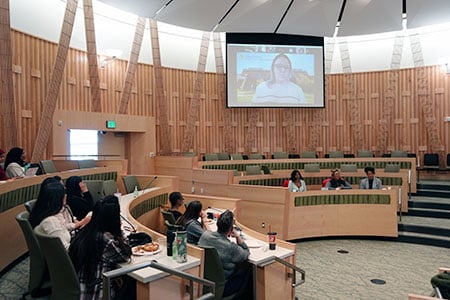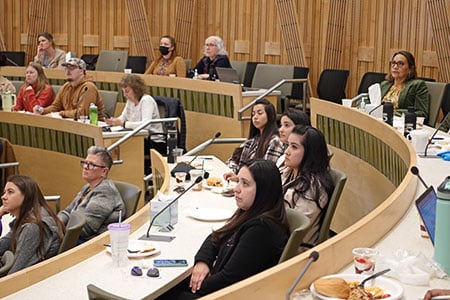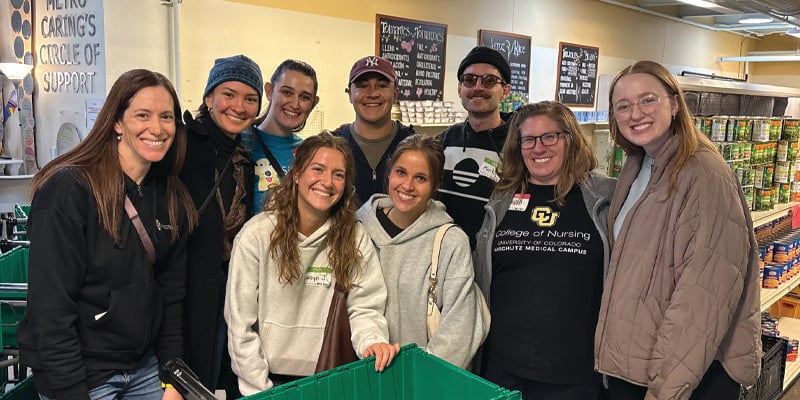Black pregnant and postpartum people in Colorado were 1.9 times more likely to die during pregnancy or within one year of the end of pregnancy compared to the state’s overall pregnant population.
A report from Colorado’s Maternal Mortality Review Committee shows Colorado’s Black pregnant and postpartum people had a 104.5 mortality rate (per 100,000 people). The overall mortality rate for Colorado’s pregnant and postpartum population is 54.7. The report analyzed data from 2016-2020.
The number one cause of maternal mortality in Colorado is self-harm and unintentional overdose for all populations. Causes across the country vary from state to state, but for Black pregnant and postpartum people, the number one cause of death is cardiac or coronary causes.
What’s being done to protect our Black mothers? A panel discussion at the University of Colorado College of Nursing at Anschutz Medical Campus tried to find solutions.
Preventable Deaths
“According to the CDC, approximately 80% of these deaths are preventable,” CU Nursing Associate Professor and Director of Midwifery & Women’s Health Services Jessica Anderson, DNP, CNM, WHNP, FACNM, says. She was one of the panelists who brought the perspective from someone sitting on the Maternal Mortality Review Committee and broke down data from the state. “In almost 90% of these deaths, something could have been done differently at some point in the perinatal period.”
Anderson says from a state perspective, Colorado is starting to implement some initiatives to prevent maternal deaths. The Colorado Perinatal Care Quality Collaborative is one example of an organization that is implementing evidence-based initiatives to improve maternal outcomes. The group looks at the causes of death and gives guidance to hospital systems and providers to offer better care.
Another area the state looks at while studying maternal deaths is discrimination as a contributing factor. Anderson says around 50% of the time, discrimination contributed to someone’s death.
“When we’re talking about discrimination, it’s based on information brought forward from key informants, or health care records, or even knowing a little bit about the person before they died,” she says. “It’s one question we intentionally ask while investigating maternal deaths. It’s been extremely eye-opening, but also helpful because it allows us to give a voice to the complexity of Black maternal deaths with the hope of finding a way to improve care moving forward.”
The goal of the maternal mortality data and causes has shaped the recommendations the committee has put forward in the 2023 Legislative Report.
“The Trauma is Real”

CU Nursing panel discussion 'Saving Our Black Mothers' |
One of the panelists, Julie Clockston, DSW, LCSW, Cert ED, talked about the discrimination and trauma she went through giving birth to two of her children. Clockston is an assistant professor at Metropolitan State University in Denver.
“The trauma is real,” she says. “Some of the experiences I’ve had were horrific.”
Clockston says during the birth of her first child, her maternal care lacked empathy, care, concern, and compassion. She says she didn’t receive some of the necessary care during her appointments, including blood work or certain ultrasounds.
“My power differential with the doctors and medical professionals when I was going into labor was so far away from theirs that I was feeling shut down and not able to use my voice,” she says.
Clockston arrived at the hospital while going into labor – and was told to leave and come back later. When she came back to the hospital, her doctor was asleep in the corner ahead of a shift change and her new doctor had never delivered a baby before. While she was in labor, she says a lot of hemorrhaging took place.
“To hear the doctor say, ‘I don’t know where this blood is coming from and I don’t know how to stop it’ was pretty scary,” she says.

CU Nursing faculty, staff, and students listen to guest speakers at the panel discussion 'Saving Our Black Mothers' |
She needed surgery after giving birth because sutures and other procedures weren’t done correctly. Clockston also says she wasn't informed about pre-eclampsia and the risk or possibility of the condition that can occur up to six weeks postpartum. She says while she read books and pamphlets, she felt there were gaps in how she was informed about the prenatal and the postpartum periods.
“I endured stress for so many hours, and I wasn’t being listened to,” she says. “If I said I felt a certain way, I wasn’t being heard. In my mind, I could have had my baby on the street and probably been safer than going to the hospital.”
Clockston says for her fourth child, she was met at the front desk of the hospital with apprehension and was asked to provide all her information, even though she had given the information to the hospital before. She says staff disregarded her when she said she was going into labor – and ultimately gave birth in the hallway of the hospital, not a hospital bed. During labor, a nurse accidentally stuck the wrong end of the IV into her thigh, causing more trauma and pain.
“I felt that as a Black person, I wasn’t held to the same regard as some of my friends that were having children around the same time as me and didn’t identify as Black,” she says. “My experiences in the hospital could have been so much different and could have been prevented.”
Advice for Students
Danyelle Gilbert, BS in Nursing (’21), RN, is a CU Nursing alumna and a member of the Colorado Council of Black Nurses. She works as a labor and delivery nurse at Denver Health. During the panel discussion, she gave students advice for when they get into the workforce.
Interventions to Prevent Microaggressions |
|
“Is the Black woman worth the same as the white woman? Do you value her the same as a white woman?” she asked. “You must ask these questions of yourself because it will drive the type of person you are and the care that you provide. What are your intentions? What emotions and thoughts are responsible for your behavior? We Black women get tired of having to advocate for ourselves because it’s not fair, right? You as our provider it is your job, to advocate for us!”
She told students that as providers, they should recognize their intention with patients – and value them.
“Dr. Clockston didn’t know about pre and postpartum care because she wasn’t educated on that. No one told her,” Gilbert says. “So, you need to take the time to educate your patients. I know at a bedside there’s only a short amount of time, but in that time, you focus and prioritize on your patient because that’s what we’re taught as student nurses. Educate her (your patient) on her experience and educate her on her choices.”
The panelists also told students to become active participants to stop obstetrical racism from happening while providing quality care.
“We all have a responsibility to move the needle on obstetrical racism,” Anderson says. “As a new provider, a student, or an educator – you need to be aware of what’s happening. You need to provide the best care that you can to every individual. As a provider, it’s showing up, listening to your patient, and helping to educate them whenever you can.”
Clockston says Black patients want to make connections with their medical providers. They want medical providers who are culturally relevant and treat them as individuals.
“We want you as medical professionals to keep professional boundaries, but also you should embrace the birthing person as important and not allow implicit bias to go unchecked,” she says. “You should use assessment tools to work on becoming anti-oppressive, anti-racist, and to reduce and mitigate implicit biases.”
Gilbert suggested nurses need to establish a rapport with patients early on and let a patient’s family be involved in their care.
“If you (a patient) feel that something is wrong, tell me. I cannot change what I’m not aware of, so communicate with me. I don’t want you to suffer in silence. Make sure your patient feels comfortable to the best of your ability,” she says. “Acknowledge them, acknowledge her, but most importantly, value her. And see her worth. The Black woman is the priceless portrait behind the case. She is of incalculable worth. She is worthy and deserving of you at your best. Be your best for her.”



